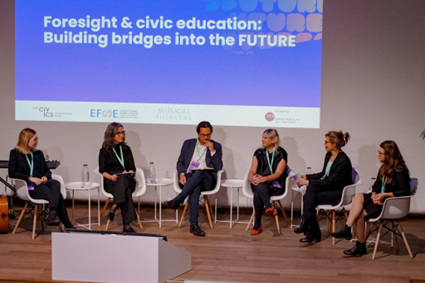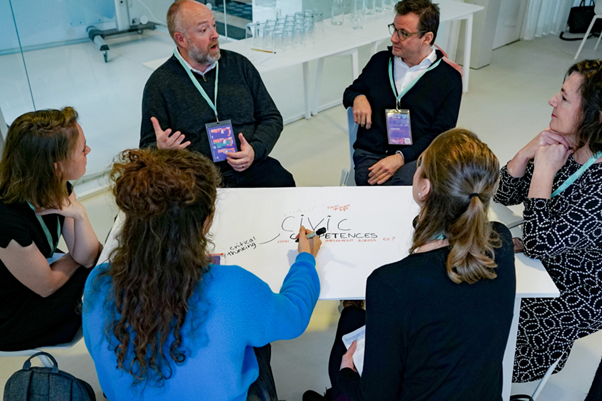The two main Civic Education challenges for Cities and Regions: Inspirational Insights from the 2023 NECE Festival
Written by Davide Muraro, EAEA.
The challenges that our society faces are big. In comparison, the resources of Local and Regional Authorities are scarce. Can Civic Education show a path to master the problems of today and tomorrow? This is only one of the many questions that were discussed in the 2023 edition of the Networking European Civic Education (NECE) Festival in Madrid, organised by The Civics Innovation Hub and funded by the German Federal Agency for Civic Education.
The event brought together experts, practitioners and researchers working on several dimensions and forms of Civic Education in Europe and beyond – ranging from young sustainability activists and musicians to teachers and renowned policy voices. Throughout interactive sessions, debates, keynote speeches but also music-based activities, participants shared best practices, explored innovative solutions and joined forces to imagine the future of Civic Education. The results could not be more relevant for the RegALE project: community-based, local actors, cooperating together, have an untapped potential to become the protagonists of Civic Education. But for that to happen, cities and regions need to address two key challenges:
1) Know the future (yes, it’s possible!)

In a state of permacrisis, it is difficult to ascertain priorities, the magnitude of some trends or their impact. But it’s not impossible. Foresight methodologies can help us understand which phenomena are here to stay, and which instead will wear off, as the “Superforecaster” Regina Joseph explained. While such techniques were originally deployed only in a military context, they can add much value to education policies and practices. This is especially true for Civic Education, which must equip learners with the tools to deal with pressing social issues of today and tomorrow. To reap the benefits of Civic Education, continuous investments in capacity-building activities for institutional actors, including at the local and regional level, education providers and teachers should be pursued, as the RegALE project recommends. Providing these enablers of Civic Education with cutting-edge methodologies, like strategic foresight, will make them capable of designing and implementing a relevant learning offer.
2) Talk to everyone

Looking at the bigger picture is important, but is certainly not enough. Also due to the impact of social media, societies across the globe are increasingly polarising. Such tensions present a real threat for the stability of our democracies, and may (and, unfortunately, have already) result(ed) in wars, discrimination, exclusion and loneliness. To rebuild our social fabric, Civic Education can help foster dialogue and mutual understanding. Human rights expert and facilitator Maja Nenadović offered a vision for this difficult task, along with useful practical tools. Dialogue starts in a community, with a neighbour, a co-worker or a fellow learner. This is why cities and regions are uniquely positioned to tackle this challenge. Moreover, networks of local and regional authorities can provide a fora for a diversity of perspectives and experiences, which can positively spill over education – and Civic Education in particular. As the RegALE project testifies, partnerships and cooperation are not only valuable to increase the efficiency and the effectiveness of adult education, but can also bring forward approaches that reflect a rich variety of views and practices.
The NECE Forum has offered inspirational insights on Civic Education. Paired with the results of RegALe project, it demonstrated that Local and Regional Authorities are fundamental agents to build a better tomorrow through Civic Education – even more so when working in partnership with each other and with other stakeholders.

[…] sildenafil citrate tablets 100 mg […]